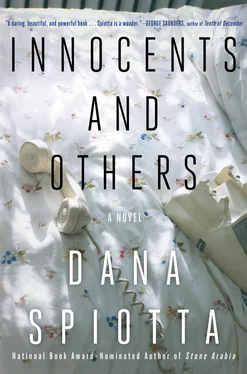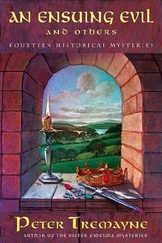Back in New York, Kyle and Meadow watched the footage, and Meadow felt a bit sickened by it. Her movie, Children of the Disappeared , was coming together in a most peculiar way. Not didactically essayed. She inflected nothing, judged nothing. The problem, she felt, was that documentary filmmakers could watch their subjects the way an American watched the distant world’s traumas on television. Watching but not engaging. Very happy with the distance between, very happy with the power and privilege of not getting too involved. Content with pointing out the horrors of people so far from each of us.
To overcome this problem, she thought she should be unobtrusive and flat, not pointed, no obvious juxtapositions of Dirty War statistics with bland home life. No easy ironies so we can hate the perpetrators from a great distance. She did this not because she had been given the trust of these monstrous people, these cold-blooded murderers and kidnappers. But because she wanted the human everydayness, their non-monstrousness to come through. She wanted the contradiction, the tension, to be clear: they participated in a horrible regime and they loved their stolen children. This made her feel very uncomfortable, which she thought was the right feeling. She let Kyle do a lot of the work as she started to feel numb toward the film. Inured to all of it. She hadn’t felt that way making a film before.
One afternoon she slipped off to Union Square. She walked to the Village East Cinema by herself, and she bought a ticket to see Girl School , Carrie’s feature film. It had been out for weeks and Meadow hadn’t seen it yet. She was catching the second show of the day on a Monday. Only a few people were in the audience, but she gathered that the film was doing very well. The “funniest film of the summer” was what the Times said. Or at least that was what was quoted on the poster outside.
She wasn’t in the right state of mind to see Carrie’s light comedy. She could feel her resistance, and she could see the setup for each joke, each pratfall, coming before it happened. It was, on its own terms, well done. Its ambition — to make a raunchy school comedy about women — was fully realized.
Meadow couldn’t wait until it finished and she slipped out before the end. She walked down the street and came to a stop. She turned back toward the theater. What was wrong with her? Why was she like this, so ungenerous? On a different day — or maybe a different time in her life — she would have laughed and gotten lost in the fun of Carrie’s film. Carrie’s perfect, playful comedy. Meadow stood there, unmoving, and lifted her glasses to wipe her eyes. Her stingy tears. What kind of person had she become, and why couldn’t she be better?
CARRIE GOES TO THE MOVIES
There were reasons, very reasonable reasons, they had not been as close. Meadow was hard to connect with on the phone, Meadow was cold sometimes, you had to be right in front of Meadow for her to engage with you. Some people were like that, but it just felt sad to realize that you hadn’t been in touch with your best friend, and in fact Carrie had closer friends if you looked at her current life. Carrie had heard nothing about Meadow’s new film until she got the invitation to the screening of Inward Operator. Carrie should have called more, but it was hard to keep up with anyone. She barely remembered to talk to Will on some days. Twelve-hour days in production. Nearly the same in postproduction. She now had a chance to make a big studio film with a real budget and well-known actors. She had been very busy, but she was determined to make it to Meadow’s screening and she did.
It was being shown as part of documentary film festival at the Walter Reade. The place was packed, and she didn’t see Meadow. Carrie sat in the dark, and she wondered if Meadow had seen her film, Girl School. She worried that Meadow had seen the film and didn’t like it, and that’s why she hadn’t talked to her about it. After all, it wasn’t Meadow’s kind of movie. But Carrie decided that Meadow was simply too busy to go see it, and eventually she would watch it and say something. The Inward Operator promotional sheet had some quotes from Meadow:
I had a formal problem right from the start. How to make a nonvisual story visual? I tried to find a way to make hearing — not seeing — the dominant sense of the film. To make the viewer listen, somehow. But by the end of the film, the power of the visual again overtakes us. The ending silent very long take of Nicole, for instance. This is Cesare Zavattini’s idea of remaining in a scene for the longest and truest duration
Carrie put it down without finishing. God! Meadow could be so pretentious sometimes. Carrie felt bad as soon as she thought that. And it wasn’t even accurate, was it? Meadow was not pretending , that wasn’t the right word. She was self-conscious and ambitious; she took herself very seriously and sometimes Carrie found it exhausting. Shouldn’t the work speak for itself? And yet there were lots of great filmmakers with manifestos. Essays and polemics. Why not Meadow? Why was Carrie so harsh on her?
The lights dimmed. So many times, in the dark waiting, and then the feeling when the music and the credits come up. This film, Meadow’s film, stayed dark after it began. A woman’s voice only, a beautiful woman’s voice and a black screen. My name is Amy, but I am also known as Jelly and Nicole.
The voice continues to tell her story and the screen stays dark. Carrie thought it looked very close, maybe too close, to the black-screen section of Meadow’s Kent State film. Why make a film if you are not using a visual? Why would Meadow want to cut off the most important sense element of cinema? But of course a black screen is a visual, isn’t it? As the woman’s voice explains phone phreaking, Meadow adds things: graphics of old phones and a series of tonal sounds. “I loved the phone. I mean, I could be myself on the phone, the self I really was, or ought to have been. I never thought of it as lying. Oz wanted the tones, the machine. I was always happy to reach an inward operator.” Then it returns to a black screen.
“What is that?” Meadow’s voice.
“People who can connect you to wherever you want to go; they are deep in the machine and essentially superoperators. I wanted to reach them because they were voices, humans, somewhere in the big wide world. Remember I was nearly sightless at the time. They talked to me from somewhere. I could be anyone and they could be anyone. A voice on the phone.
“After Oz and I broke up, after I was finished with phreaking, I moved into this small apartment by myself, where I have lived ever since 1973.”
Meadow kept withholding the image of the woman in the movie, “Nicole,” and yet Carrie still found it gripping. An occasional illuminated word from Nicole’s monologue interrupts the black screen and then fades like a firework, leaving a faint trail of itself. She talks about her life, her childhood, and how she lost her sight for a time. Still the film doesn’t show Nicole. A cityscape in black and white, Syracuse, presumably, with all its faded November bleakness.
“After the breakup, I recovered most of my sight, which was great. My pastime has always been watching movies. Even when I was mostly blind, I would try to watch movies — that’s how much I loved them.”
Now the film screen contains another film screen, like a movie theater, but the image is blurry, just moving shapes and colors.
“I listened and watched the blurs. Sometimes it felt like a hallucination, trying to fill in what I couldn’t see.”
A bright circle obscures the center of the same blurry image.
“Maybe it is like how the brain fills in our imperceptible blind spot, the part of all our eyes that actually has no photoreceptors. I looked at certain parts of the screen and imagined what else was there. It tricks you into thinking you see more than you do.”
Читать дальше












